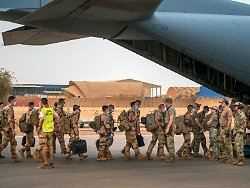Monday, October 18, 2021
Use in Mali
EU sees Wagner mercenaries as “red line”
The military junta in Mali is advancing towards Russia. She not only receives four military helicopters, but apparently also maintains contacts with the private Russian mercenary company Wagner. In the event of a mercenary deployment in the West African country, the EU has now announced consequences.
The EU openly threatens the crisis country Mali with an end to its support in the event that the Russian mercenary company Wagner is deployed. It was clearly stated that a presence of the company would be a red line, said the EU foreign affairs representative Josep Borrell after consultations with the EU foreign ministers in Luxembourg. In addition, sanctions are reserved against all those who hinder the transition in Mali. In November they will continue to discuss the issue.
The German Foreign Minister Heiko Maas said: “The question of whether foreign mercenaries are employed there by the Malian government is an issue that we are following very, very critically.” The pressure on those responsible in the Sahel country will be increased significantly in the coming days and weeks.
In Mali, the military overthrew the transitional government in May, which was supposed to be in office until the 2022 presidential election. Putschist leader Assimi Goita was then proclaimed the new interim president. Recently, reports of a possible deployment of troops from the Russian mercenary company Wagner in the West African country also caused further concern.
Russia’s Foreign Minister Sergei Lavrov recently defended Mali without mentioning the name “Wagner”. You turned to a private military company from Russia, he said. “As I understand it, in connection with the fact that France wants to significantly reduce its military contingent that was there and (…) should fight terrorists.” Mali is turning to the private Russian company on a “legitimate basis”. Mali’s Prime Minister Choguel Kokalla Maïga had accused France of abandoning his country with a “unilateral” decision to withdraw troops.
France is leaving, Russia is coming?
France began restructuring its military presence in the Sahel in June. The plan envisages a reduction in troop strength from currently over 5,000 soldiers to around 2,000 to 3,000 soldiers by 2023.
Mali recently received four military helicopters from Russia itself. “We are here tonight to collect four Mi-171 helicopters, weapons and ammunition,” said Defense Minister Sadio Camara on the occasion, praising Moscow’s “reliability and seriousness”. The military government in Bamako and the EU, however, appear to be getting on less well.
Among other things, the EU is active in Mali with a military training mission (EUTM Mali). The aim of the mission is actually to support the armed forces in the region with advice and training so that they can effectively counter threats from terrorist groups. The unstable crisis state has been plagued by Islamist terror groups for years. There is also the EUCAP Sahel Mali mission. It is supposed to support the national police, the national gendarmerie and the national guard in the implementation of a security reform. Germany had recently stationed around 1,300 soldiers in Mali. A little more than 300 of them were assigned to EUTM Mali, the others to the United Nations Stabilization Mission (MINUSMA).
